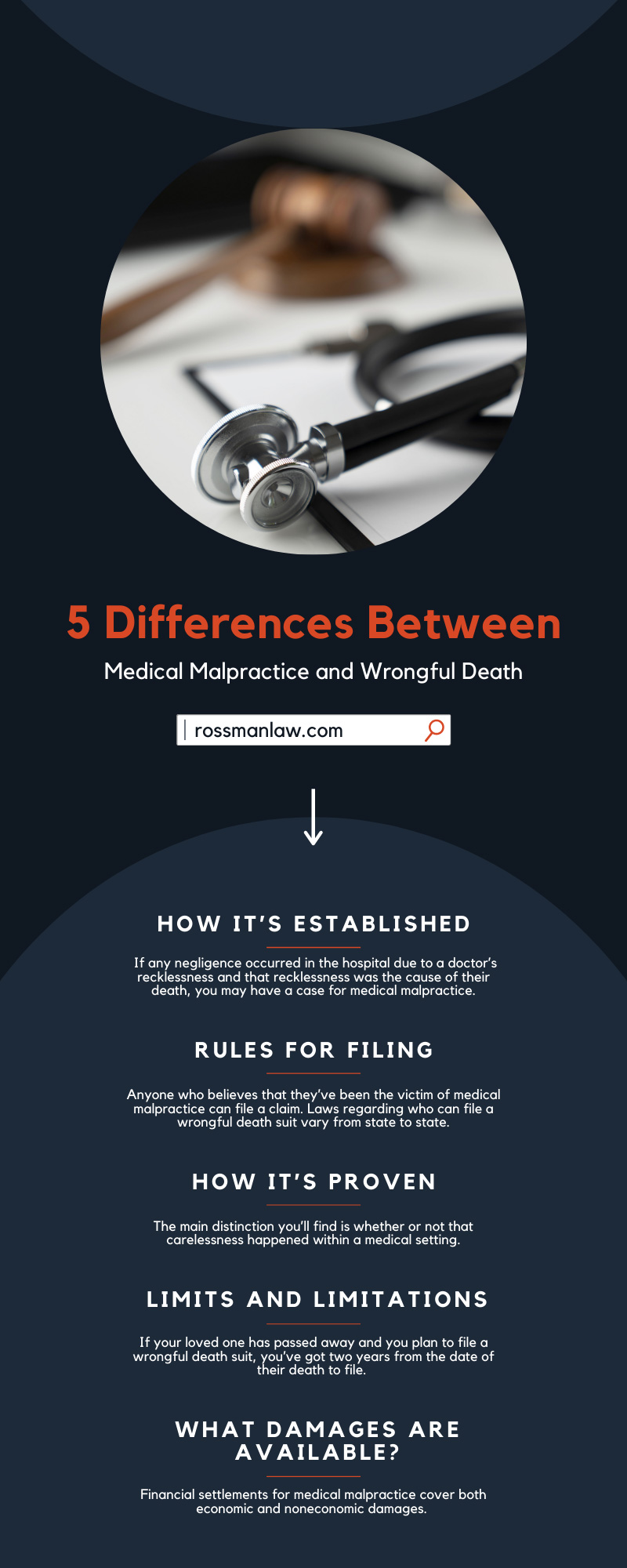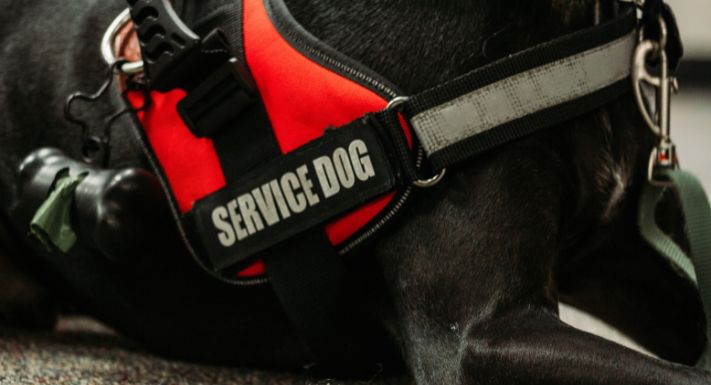
What Groups Are Liable for a Fentanyl Overdose?
October 6, 2021
Hazards To Look Out for in Public Spaces
October 19, 2021What differentiates a medical malpractice suit from a wrongful death suit? Many kinds of neglect and negligence can lead to preventable deaths. If the person’s death occurred during a hospital stay or medical procedure, your suit may have elements of both wrongful death and medical malpractice. There are a few basics that apply to both situations, like another party’s recklessness or negligence. For example, your attorney may use proof of medical malpractice as evidence in a wrongful death case. However, there are marked differences between the two! Before you call Rossman Law Group for a consultation, read up on the differences between medical malpractice and wrongful death.
How It’s Established
Medical malpractice and wrongful death both boil down to another party’s recklessness or negligence with your loved one’s safety. However, just because there’s an overlap doesn’t mean they’re the same thing! Wrongful deaths can occur outside a hospital setting, like in the case of a car accident or workplace injury. And of course, medical malpractice doesn’t always result in death. That’s the most obvious difference.
When determining whether you have a case for medical malpractice or wrongful death, your attorney will locate the specific event or events that caused your loved one’s death. If any negligence occurred in the hospital due to a doctor’s recklessness and that recklessness was the cause of their death, you may have a case for medical malpractice. However, if your loved one’s medical device malfunctioned due to a manufacturing defect, like if their crutches broke and they fell, your attorney may pursue a wrongful death case. If you’re still unsure of how to navigate these differences, call a medical malpractice lawyer in Boise, Idaho; Rossman Law Group cares about seeking restitution for you and your family.
Rules for Filing
Anyone who believes that they’ve been the victim of medical malpractice can file a claim. They’ll have to prove that reckless negligence occurred while they were being treated for an illness or injury. If you plan to file for medical malpractice, you’ll need to gather all relevant paperwork, like medical bills and histories, as proof of malpractice before you head to court.
Because the party in question in a wrongful death case obviously can’t file for themselves, that duty generally goes to the closest living relative. This is often a spouse, parent, or child. Laws regarding who can file a wrongful death suit vary from state to state. In Idaho, the executor of the deceased person’s estate and any heirs to that estate can file a wrongful death suit, as well as the person’s spouse, parent, or child.
In addition, if you depended on the deceased person for “support or services” (like their income and any chores around the house), you can file for wrongful death. If you’re a blood relative of the deceased, an adopted sibling, or a putative spouse, this extension applies to you. (A putative spouse is a person who truly—but mistakenly—believed that they were legally married to the deceased person.)
How It’s Proven
Remember how medical malpractice and wrongful death are established? You’ll need to do some detective work to find the central reason for your loved one’s death. The main distinction you’ll find is whether or not that carelessness happened within a medical setting.
Medical malpractice can happen at any point during the course of treatment, from diagnosis to follow-up. A doctor could mix up their charts when speaking to your loved one and give them the wrong test results. A nurse could give them an incorrect dosage of their medication. If your loved one is under the care of a medical professional, that professional has a duty of care to your loved one. Any violation of that duty of care, whether accidental or otherwise, puts that medical professional at risk of a malpractice suit.
Wrongful death suits often intersect with medical malpractice claims. If your loved one passed away due to hospital negligence, your wrongful death suit will need to prove that medical malpractice occurred. You’ll need to prove that that medical professional’s negligence directly caused your loved one’s death. If that death didn’t occur in a medical setting, you may not be able to file for medical malpractice—but you could still have a wrongful death case. Defective medical devices and mislabeled medications point to a different cause of death, but a wrongful one nonetheless.
Limits and Limitations
As discussed before, there are a few limits on who can file a wrongful death suit. That privilege is normally reserved for the executor of the deceased person’s estate and their immediate family. Meanwhile, anybody can file for medical malpractice as long as they’ve got the proper paperwork in hand.
You’ve got to jump on filing that suit as soon as possible, though. Medical malpractice and wrongful death suits can spend a long time tangled up in the court system, and there are statutes of limitations to follow. In the state of Idaho, you’ve got two years from the date the alleged malpractice occurred to file a medical malpractice lawsuit. (This is why it’s important to keep meticulous medical records—you’ve got to have proof of that exact date.) If your loved one has passed away and you plan to file a wrongful death suit, you’ve got two years from the date of their death to file. A date of death is much easier to remember than a date of alleged malpractice.
What Damages Are Available?
Financial settlements for medical malpractice cover both economic and noneconomic damages. Economic damages are tangible, provable costs for which you need recompense, like medical bills and receipts for medication and medical devices. Noneconomic damages are commonly called “pain and suffering,” and include compensation for mental and emotional distress sustained due to the malpractice.
Damages for wrongful death suits are similar to those for medical malpractice suits, but with a few more expenses piled on top. Funerals can get expensive, whether you opt for burial or cremation. If your deceased loved one contributed financially to your household, you’ve just lost a big chunk of your income. Loss of consortium (companionship and comfort) is also a common damage; when you lose somebody close to you, you deserve restitution for that loneliness.
When you experience a tragic but preventable loss in your family, you may want to seek compensation for your ordeal. Rossman Law Group’s team of medical malpractice lawyers in Boise, Idaho can help you differentiate between wrongful death and medical malpractice suits. We can advise you on whether you’ve got a case for either. Now that we’ve laid out the differences between medical malpractice and wrongful death, decide whether filing a lawsuit is the right choice for you and your family.






